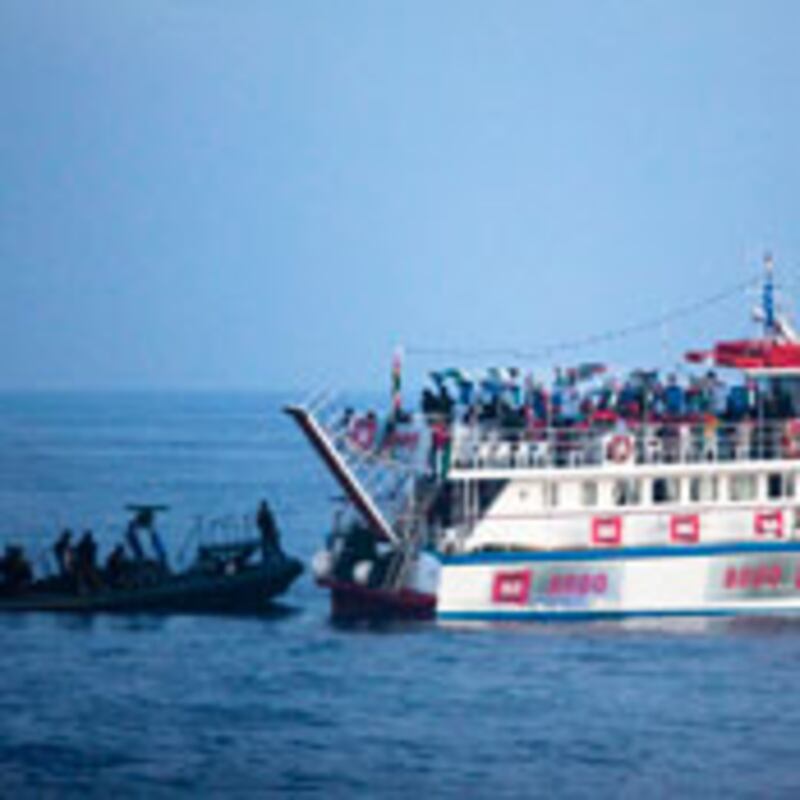
“The armada of hate and violence in support of Hamas, a terror organization, was a premeditated and outrageous provocation. The organizers are well known for their ties to global jihad, al Qaeda, and Hamas. They have a history of arms smuggling and deadly terror.”
By stubbornly and repeatedly contradicting every international aid and human-rights organization in the world on the humanitarian crisis in Gaza, the Israeli government’s PR machine has overreached.
Just so we are all on the same page, this is how Israel’s deputy foreign minister, Danny Ayalon, described the flotilla of ships stormed by Israeli commandos in a pre-dawn raid Monday morning. Note that he is describing ships carrying humanitarian aid, human-rights workers, about a dozen doctors, some 30 journalists, two retired U.S. diplomats (Amb. Edward Peck and Ret. Col. Ann Wright), a Nobel Peace Prize winner (Mairead Maguire), a former U.N. assistant secretary-general (Denis Halliday), and several members of parliament from Ireland, Germany, Sweden, Turkey, and Malaysia.
• Leslie H. Gelb: Israel Was Right• Israel’s Indefensible Behavior• Read our complete coverage of the crisis in IsraelThis was how Mark Regev, the Israeli government’s spokesman, described the response of passengers aboard the Turkish passenger ship Mavi Marmara when they were raided at 4 a.m. by an elite corps of heavily armed Israeli commandos who jumped from military helicopters and naval warships and shot live rounds, used tear gas and stun grenades, and killed at least nine people: “Why did they have a problem with an inspection process?”
This is how Israel’s defense minister, Ehud Barak, who has repeatedly stated that there is no humanitarian crisis in Gaza, described the entire Free Gaza movement, whose aid ships have been trying to break through Israel’s blockade of Gaza for the past three years: “The entire flotilla is a political and media provocation by anti-Israeli activists. They have absolutely nothing to do with humanitarian aid.”
By now we are all familiar with the power and potency of the Israeli government’s propaganda machine—the hasbara, or “public relations operation,” which has been on overdrive over the last 24 hours. Israel’s No. 1 priority right now, as voiced by Likud member and former Israel Defense Forces spokeswoman Miri Regev, is to deal with the negative media reports quickly, “ so they would go away.”
No other country can boast the speed and efficiency of the Israeli government in responding to the slightest criticism of its policies or actions, as the Jewish Chronicle outlined in an article about Israel’s new and improved PR strategy, put in place after the debacle of the Lebanon war in 2006. The Chronicle summed up the strategy as “Fewer military officers; more women; tightly controlled messages; and ministers kept on a short leash.”
This is the infamous state propaganda machine that managed to paint the internationally renowned and widely respected South African judge Richard Goldstone, a trustee of Israel’s Hebrew University and former president of the Jewish charity organization World ORT, as “a self-hating Jew” and an “anti-Semite” for suggesting that Israel investigate “all violations of international human-rights law and international humanitarian law that might have been committed at any time in the context of the military operations that were conducted in Gaza during the period from 27 December 2008 and 18 January 2009, whether before, during or after”—the exact wording of the Goldstone report.
But it now seems that even governments can occasionally “jump the shark.” By suggesting that a group of aid workers, human-rights activists, EU parliamentarians, and U.S. diplomats are supporters of al Qaeda, by describing a pre-dawn military attack on a convoy ship as “an inspection,” and by stubbornly and repeatedly contradicting every single international aid and human-rights organization in the world regarding the humanitarian crisis in Gaza, the Israeli government’s PR machine has overreached.
The facts of the bloody attack against the flotilla have yet to be made clear, mostly because Israel is controlling all access to information and refusing to allow foreign journalists access to any of the hundreds of passengers it has detained—a classic hasbara maneuver. Yet the fallout from this latest blunder by the Netanyahu government is already clear (I say the Netanyahu government because it is Bibi, not the IDF soldiers he sent to board a ship in international waters, who is to blame for this fiasco).
Former South African President Nelson Mandela and Archbishop Desmond Tutu, both of whom have called Israel’s three-year blockade of Gaza “one of the world’s greatest human-rights violations,” condemned the attack on the flotilla as “completely inexcusable.” Lebanese Prime Minister Saad Hariri, the same Hariri who is considered America’s best friend and ally in Lebanon, warned that Israel’s attack on the flotilla may ignite a war in the region. France, Greece, Sweden, Jordan, Egypt, Turkey, and Belgium have all summoned their Israeli ambassadors for an explanation. Greece has canceled joint military exercises with the Israeli air force. Turkey, one of Israel’s most important trade partners, has convened a high-level cabinet meeting to assess its options, which include the possibility of pursuing a lawsuit against Israel for violating international law. The U.N. special coordinator for the Middle East peace process, Robert Serry, and the commissioner general of the U.N. Relief and Works Agency, Filippo Grandi, released a joint statement arguing that, no matter who is ultimately to blame, “such tragedies are entirely avoidable if Israel heeds the repeated calls of the international community to end its counterproductive and unacceptable blockade of Gaza.”
Of course, none of this really matters. I know that nothing any of the international organizations, peace prize winners, diplomats, or religious figures cited above says will change the situation in Gaza, just as nothing that I write here will change anyone’s mind about what is taking place in that dreadful strip of land. Just scroll down to the comments section at the bottom of this article to see how all of this works.
Here’s what happens now: Everyone will quickly retreat to their respective sides and begin spouting their predisposed positions. People like me will be called “Jew-haters,” and “anti-Semites” for doing what every single Israeli citizen I have ever met does on a daily basis—indeed, what thousands of Israelis gathered in Tel Aviv are doing right now—criticizing the actions of the Israeli government. Just as predictably, the anti-Israel crowd will jump on my words as an invitation to post their own ridiculous rhetoric about apartheid and genocide and all the other flash words that have no place in a rational discussion about the Israeli-Palestinian conflict.
The international community will complain loudly, to no avail. The United States will issue a halfhearted rebuke and some useless words about “deploring the deaths” that occurred on the ships. Hamas will be further strengthened by the attacks, while the Palestinian Authority, which is desperately trying to engage Israel in indirect negotiations, will be further weakened. The Israeli government will perform a cursory investigation that will only reaffirm its conclusions that this was all the fault of the ship’s passengers and then continue its avowed policy to punish the entire population of Gaza for the actions of Hamas.
And by tomorrow a few more Gazans, 80 percent of whom live below the poverty line, will die of malnutrition and lack of access to clean water and medicine.
At what point are rational, peace-loving, Israel-supporting people of the world going to stand up and say “enough”? How much longer are we to bear the hasbara propaganda that places the image of the state of Israel above its well-being? How much longer are we going to accept the cries of victimization from the strongest and richest nation in the Middle East? How much longer are we going to put up with a policy of collective punishments that has led to the slow starvation of 1.5 million people?
But, of course, I’ve given myself away as an anti-Semite just by asking such questions, haven’t I? So then, dear reader, I guess you can just ignore these questions altogether and proceed to your pre-assigned positions.
Reza Aslan is author of the international bestseller No god but God and How to Win a Cosmic War (published in paperback as Beyond Fundamentalism: Confronting Religious Extremism in a Globalized World). Follow him on Twitter and Facebook.





